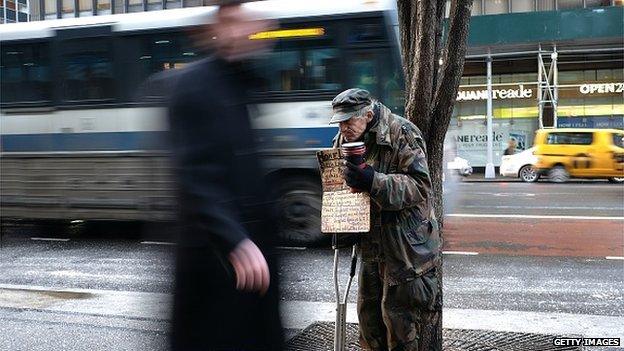Enriching the rich in the US - but what about the rest?
- Published
- comments

Has the land of opportunity created a society of haves and have-nots? Is the US economy now just enriching the rich? Inequality has been noticeable since the recession, but the income gap has been growing for decades.
During the economic boom of the 1950s in the United States, the top 1% gained a bit more than the rest - grabbing some 5% of the incomes gained during expansions.
But now the top 1% accounts for 95% of the income gains after the great recession of 2008, leaving the bottom 99% with just 5% of the income gains.
It's usually low interest rates and cheap money that drive a recovery, and that usually boosts stocks. US markets have hit numerous record highs since the 2008 crisis, and those gains now predominantly go to the top 10% - because they own 91% of all stocks.
It used to be more equitable in that half of US households owned stocks.
Those are the immediate reasons why inequality has risen in the US, but inequality has been on the rise for far longer.
Inequality fell after the first Gilded Age during the 1920s, especially during the 1950s and 1960s when per capita GDP grew strongly during what's called the Golden Age of the US economy.
But starting in the 1970s, the income gap ceased narrowing and then started rising sharply after 1980 - reaching the present where it is more unequal than ever before.
Linda Yueh explains why inequality has grown in the US
Reasons for widening inequality
In Talking Business, we discussed the longer term causes of inequality. Panellists including former US Labor Secretary Robert Reich argued that there are several forces driving up inequality.
Firstly, globalisation has driven down median wages and those who gain from trade - the skilled workers and owners of capital - have earned more while the middle- and lower-skilled lost out, which has widened the gap.
It is also due to what economists call skill-biased technical change. As the US economy becomes more technologically driven, it is again skilled workers who benefit.
The two are related of course, as the US can specialise in the higher-skilled technical fields since it can import what it no longer produces from overseas.
Robert Reich also says that decreased unionisation weakened workers' bargaining power over wages, while Dean Baker, co-founder of the Center for Economic and Policy Research, points to monetary policy favouring low interest rates over targeting employment.
As Jason Furman, the chairman of President Obama's Council of Economic Advisers, points out, the rise in inequality in the US is the greatest amongst advanced economies.
He says that President Obama used redistributive taxation to address inequality in his first term and this current budget focuses on raising the minimum wage and inheritance tax as ways of raising wages for the middle class.
Influential French economist Thomas Piketty has called for a global wealth tax
However, Bain founder Ed Conard argues that raising taxes to reduce inequality is not a long-term solution and can harm companies.
Bridging the gap
Whether it matters was also hotly debated, as were the solutions.
David Azzerad from the Heritage Foundation think tank argued that if the rich have not got rich illegally, then why does inequality matter?
Messrs Reich and Baker countered that the issue is having the opportunity to earn a good income - when the structure of the economy has changed to make that harder than ever before.
Most of the discussions centred on wages for average workers, and how to raise these rather than taxing the rich. A global wealth tax was the solution proposed by Thomas Piketty, who has elevated this issue globally.
In other words, if the forces of globalisation, technological change, etc. are exacerbating inequality, then the tax system could be used to redistribute wealth.
If you looked at the Gini coefficient, which is a measure of income inequality, those would be much higher for the US and the UK without the progressive tax system and redistributive policies around social welfare.
Share ownership in the US is now largely confined to the rich
American dream no more?
But the panel disagreed over whether government should play such a role and how much, if at all, there are global forces at play.
For instance, Ed Conard argued for reforming the trade regime to get to the root cause rather than more government interference.
Jennifer Erickson from the Center for American Progress countered that addressing wages was key but that government should play a proactive role in reducing inequality.
One theme was evident throughout - the rich getting richer has squeezed the middle class.
America terms itself the land of opportunity where anyone can have a house with a white picket fence and a good job. However, that dream is getting harder to reach for many Americans - while the rich continue to get richer as median wages continue to stagnate.
For more, watch Talking Business with Linda Yueh. Details of when to watch are at bbc.com/talkingbusiness.
For more on the BBC's A Richer World season, go to www.bbc.com/richerworld - or join the discussion on Twitter using the hashtag #BBCRicherWorld.